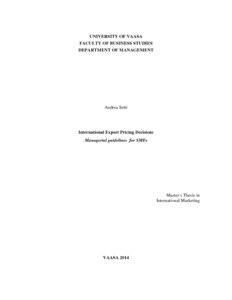Export pricing
Setti, Andrea (2014)
Kuvaus
Opinnäytetyö kokotekstinä PDF-muodossa.
Tiivistelmä
In the actual context of recession in Europe small and medium enterprises are striving to expand their business abroad. Export pricing strategies are an essential tool for market expansion but the literature still presents a big gap. This gap is ascribable to a lack of qualitative studies which can produce advancements in the field and also managerial guidelines are needed to undertake export activities. Through the analysis of business cases this research is aimed at the identification of the main determinants that characterise an export pricing strategy jointly with the in-depth understanding of managerial issues that can be used by managers involved in export activities. This study will reach its goal through the achievement of three main objectives that are the creation of a theoretical model after analysing the existing literature, make an empirical investigation through interviews and obtain a final version of an export pricing model after reviewing the findings. Qualitative data will be collected with in-depth interviews within a range of managers directly involved in export pricing decisions and coming from different business sectors. Six determinants will be asked directly in the interviews and the other will be deducted from data collected. The innovative feature of this research is the introduction of a cultural dimension that has never been analysed before by previously researches but for two studies on psychic distance. At the end of the investigation, the results will show a different picture in respect of what has been observed in the literature. Different level of adaptation in respect of what has been observed by the theoretical constructs is shown and two new determinants are highlighted. The main limitations derives from the usage of qualitative analysis which generalizability is not verified, therefore further studies adopting a quantitative approach should be undertaken in order to verify and test what has been found. This research was also important as a vehicle of introducing practical guidelines that marketers need in performing export activities. Form the interviews will emerge also that knowledge on different cultures is strongly needed and has an influence on export pricing strategies at the initial stage in which skimming pricing strategies are engaged in overcoming the cultural gaps.
